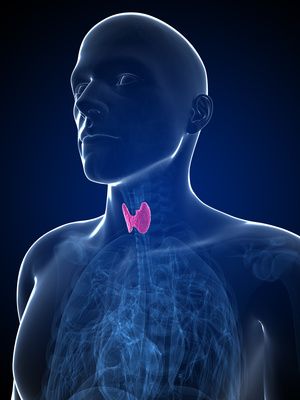The test commonly used to screen for hypothyroidism is TSH. TSH is “thyroid stimulating hormone” and it is produced by the pituitary gland. Many cases of hypothyroidism are missed because screening for TSH is not always done and because TSH is an inadequate test for thyroid function. As many as 13 million Americans may have an undiagnosed thyroid problem, according to a study known as the Colorado Thyroid Disease Prevalence Study. The study was performed by Knoll Parmaceutical (makers of Synthroid). Over 25,000 participants were studied in 1995. The researchers found that nearly 9% of the participants who were not on thyroid medication were hypothyroid and a little over 1% were hyperthyroid. If this number were extrapolated to the entire US population, the number of patients with an undiagnosed thyroid problem would number 13 million. The study also found that even “subclinical” hypothyroidism, may raise cholesterol levels.
Research appearing in Wien Klin Wochenschr (2006; 117(18): 636-40) looked at 85 hypothyroid patients, 114 normal subjects and the implications of merely using TSH to evaluate their thyroid status. Researchers found that T3 and sex hormone-binding globulin (SHBG) were lower in subjects with hypothyroidism than in subjects with normal thyroid function. Treating the hypothyroid subjects with T4 gave them TSH levels on a par with the subjects who had normal thyroid function. Although the TSH level was normal, they tended to have lower T3 (which is the more active form of thyroid hormone) levels. The authors concluded that measuring TSH may not be the best way to monitor hypothyroid patients.
The British Medical Journal [BMJ 2000;320:1332-1334 (13 May)] published research examining the flaws in diagnosing hypothyroidism. The authors concluded that there are indeed flaws with the way that we diagnose hypothyroidism. First of all, the research is lacking that shows us the relative importance of lab tests and symptomatology in diagnosing the thyroid. TSH production is affected by the level of thyroid hormone, but it is also affected by other things. We don’t fully understand how various illnesses affect TSH and the thyroid hormones. There is also a need to consider the possibilities of false positive and false negative results when looking at lab tests related to the thyroid.
The fact of the matter is that there are a lot of patients exhibiting the symptoms of hypothyroidism, but are told that their TSH is normal and that there is no problem with the thyroid. Symptoms of hypothyroidism include: fatigue (and lack of motivation), feeling cold when others do not, dry skin, constipation, depression, difficulty losing weight, brittle hair and nails that break easily, poor memory, muscle cramps, sadness or crying for no reason, high cholesterol, and frequent colds. The patient does not necessarily have all of the symptoms, but often has several of them.
In most medical offices, a TSH value of 6 is considered normal. The reality is that many people with a TSH higher than 3 (or even 2) exhibit many symptoms of hypothyroidism. Practitioners who utilize nutrition and other natural health care methods often get good results with these patients. The symptoms are the key. The lab results help, but are not a perfect way to diagnose because when relying only on lab tests many cases of hypothyroidism are missed and the patient continues to suffer.





